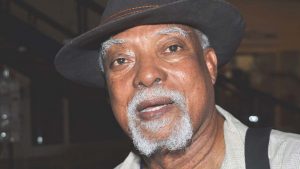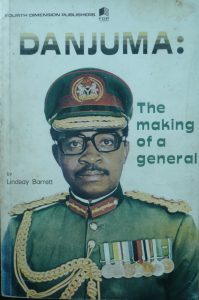Somewhere in Abuja, Nigeria, later this morning, Lindsay Barret, the one man encyclopedia on Nigerian affairs will be reflecting on the scenario which has been so common place of late: Nigeria’s break-up. Below is a reworked version of this same presentation by him at a previous occasion. It cannot but be vintage Lindsay whose pair, Ben Asante, is unfortunately lying sick now in Ghana. Africa owes the two gentlemen a debt of gratitude. They were at nearly every spot where Africa has been exploding into violence before and after the Cold War, capturing the details for history and History. Ben Asante is deserving of whatever help from any wealthy Nigerian at his hour of need!

The author
By Lindsay Barrett
The likelihood of Nigeria breaking up has never been discussed with such vehemence and apparent seriousness as a part of the regular discourse of political anticipation since the end of the civil war in 1970 as has occurred over the last half of a decade, that is between 2016 and 2021. Events occurring in various parts of the country have provoked debates and deliberations in the national legislature as well as in the state assemblies on the feasibility as well as the advisability of the nation continuing to trust in the resilience of the existing formula of its being. Shortly after the change of leadership brought about by the 2015 election there was a swift decline in the nation’s economic well-being in response to shocks created by a sudden dip in the price of oil. In addition to this there was a downturn of faith in Nigeria’s ability to meet its obligation to remain a stable and secure national entity, on the part of many of the nation’s conventional regional and international partners. This was due to the fact that an unprecedented surge of irregular terrorist activity in various parts of the nation gave the impression that the national security apparatus appeared to be virtually unable to overcome serious challenges to the stability and cohesion of the diverse communities that make up the nation. The rise of insurgency and outright banditry as an almost constant element of daily life in some parts of the nation has brought about a situation in which it has become clear that Nigerian unity is under siege. It is now becoming increasingly important that the leaders of the Nigerian political space should regard the danger of disintegration of the state as a real possibility and tailor their governing principles and strategies towards preventing this from occurring. This has become more necessary in the contemporary experience of governance in Nigeria precisely because some parts of the nation are experiencing challenges that threaten the maintenance of national unity directly.
This has been especially so in the North-East where the Boko Haram sect escalated its activities exponentially during the tenure, and after the electoral defeat, of the People’s Democratic Party (PDP), the former ruling party, occurred in 2015, as well as in the North Central zone especially in the southern parts of Kaduna State where brutal attacks on some so-called indigenous minority communities have become almost endemic, in the North Western state of Zamfara where gangs of alien bandits have mounted constant raids on rural villages for several years, and in the Middle Belt states of Plateau, Benue, Taraba. and Kogi, and some South-Western states where traditional rivalries between nomadic herdsmen and agrarian indigenes have taken on frightening dimensions. These irredentist crises have generated an overbearing sense of public dissatisfaction with government’s inability to either anticipate or prevent a surge of lawlessness in these territories even while official agencies claim unprecedented victories against perpetrators of terror, especially Boko Haram. Imprecise and inefficient actions taken by the major agencies of security management have given rise to expressions of distrust and lack of confidence in the government’s ability to govern. Instead the general impression of governmental incompetence in handling challenges to the stability of the nation has grown to become a major element of the democratic political discourse of the national order. In this connection the hesitancy exhibited by government in handling major issues such as the impact of climate change on territorial usage by nomadic citizens has provoked extant conflicts that should have been foreseen and prevented, but which instead have been aggravated by neglect and mismanagement.

One of Lindsay Barret’s enduring works
For several decades it has been obvious to even the most casual observer that the growth of Nigeria’s population would lead to conflict between agrarian settlers and nomadic pastoral herdsmen if the customary practices of centuries were not effectively transformed to suit contemporary circumstances. As a result, the lack of development of an official agency or policy to prevent conflicts that are almost inevitable as a consequence of the nature of Nigeria’s formative origins can be seen as the true cause of growing instability. It would, however, be wrong for any observer to assume that this mood of public dissatisfaction is an exclusive characteristic of public reaction to the era of government that has come into existence since the All Progressives Congress (APC) led by President Buhari came to power. During President Goodluck Jonathan’s tenure on the ticket of the PDP the impolitic fracturing of his party and the damaging spread of insurgency in the North-East, as well as a plethora of seemingly well documented allegations of corporate corruption among some members of the government’s inner circles, created an impression of fragmentation and uncertainty in the country. When the Jonathan government decided to convene a comprehensive National Conference, this initiative should have been more than enough to convince any honest observer of Nigerian affairs that Dr. Jonathan’s attitude to the defence and consolidation of the national patrimony was based on a genuine desire to refresh the principles of nationalism in leadership. Instead it appears to have helped to invigorate regional opposition to his candidacy precisely because it indicated that he was seeking to render impotent some of the most negative and dysfunctional attitudes in public life and governance. Nevertheless, in recent times the vigour with which political commentators advocate that the corrective attitude displayed by Jonathan needs to be adopted by Nigeria’s leadership has increased in response to the escalation of irregular violence and issues of regional contestation.
It is not therefore surprising that the new ruling party under the leadership of its pioneering Chairman the technocrat Chief John Odigie-Oyegun established a committee to examine the real depth and authenticity of public calls for true federalism. The APC report on this subject turned out to be very close in its findings to those that emanated from the national conference convened by Jonathan’s government, thus proving that the Nigerian impulse for preserving national unity transcends partisan sentiment. In fact, the sentimental search for ideals of good governance and true representativeness that drives and provokes these considerations has been a constant concern in the Nigerian polity throughout the entire span of the nation’s existence ever since the colonial amalgamation exercise of 1914. It gave rise to the primary philosophical underpinnings of the call for independence especially as articulated by the great pioneering nationalist Ernest Ikoli and it played a very profound part in aggravating the circumstances that led to the civil war. The first military intervention of January 1966 was stymied by operational inefficiency and regional bias and as a consequence the initiators of the coup were not the ones who eventually took power. The fact that the most prominent victims of that intervention were powerful regional leaders from the North like the charismatic Sir Ahmadu Bello, Sardauna of Sokoto, and the Prime Minister of Nigeria Sir Abubakar Tafawa Balewa or their supporters like Chief Samuel Akintola from the Western Region and Chief Festus Okotie-Eboh from the Midwest Region gave the coup a serious negative colouration especially when it emerged that no prominent leaders from the Ibo ethnic group, to which the coup leader Major Chukwuma Kaduna Nzeogwu belonged, had lost their lives. The second intervention that occurred in July of that same year was therefore meant to be a corrective action. However, the element of revenge that coloured some of the actions taken against officers of Ibo origin by some participants of that intervention, even against the wishes of some of the Northern officers who led it under the command o then Lt. Col. Yakubu Gowon, created a situation in which military confrontation between regionalist supporters of the political ideas of separation and cohesion became inevitable. It was this tragic circumstance that led to the brutal thirty-month civil war that lasted from mid-1967 until January 1970.
At that point in the nation’s history, the intervention of young army officers in the political space proved to be both transformative of, and detrimental to, the regional unity of the newly independent nation. The most positive consequence of the outcome of the July 1966 coup was the devolution of the regional formula of governance that was replaced with that of states as the federating units. At the time that this decision was taken, the major purpose for the change was regarded as being an aspect of military planning to justify invading the Eastern Region in defence of the new states. The fact that these new states were the locations of the nation’s then relatively new oil industry became the most important economic motivation for the conduct of the Nigerian conflict. This strategic formula was consolidated.




























